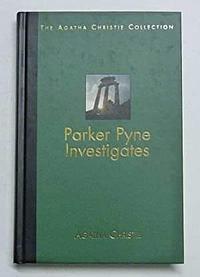Take a photo of a barcode or cover
Some of the short stories are stronger then others, but I did enjoy them all to a degree.
funny
mysterious
relaxing
fast-paced
Very enjoyable in a put - the - feet - up on a cold winters night kind of way.
A pleasant collection of short stories and an intriguing switch of character for Christie. It’s where we’re first truly introduced to Ariadne Oliver and Miss Lemon, whom we see later in Poirot. Knowing how much Christie ended up hating writing Poirot, this is almost what I imagine she truly thought Poirot to be—a retired busybody earning money off of making others happy, rather than crime, but got stuck using Poirot as a murder mystery detective. It’s clever at times, re-readable, but overall “fine.”
3.5. - 4 stars
This is not your typical Agatha Christie story and Parker Pyne really isn’t your typical detective, or a detective at all.
His specialty is making people happy.
What a neat collection of short stories. I especially enjoyed the first stories in the book. ( the case of the rich woman was probably my favorite )
This is not your typical Agatha Christie story and Parker Pyne really isn’t your typical detective, or a detective at all.
His specialty is making people happy.
What a neat collection of short stories. I especially enjoyed the first stories in the book. ( the case of the rich woman was probably my favorite )
adventurous
lighthearted
mysterious
tense
fast-paced
Plot or Character Driven:
Plot
Strong character development:
No
Loveable characters:
No
Diverse cast of characters:
No
Flaws of characters a main focus:
No
Minor: Misogyny, Racism
mysterious
medium-paced
lighthearted
mysterious
fast-paced
Plot or Character Driven:
Plot
Strong character development:
No
Loveable characters:
Complicated
Diverse cast of characters:
Yes
Flaws of characters a main focus:
No
adventurous
lighthearted
mysterious
fast-paced
Plot or Character Driven:
Plot
Strong character development:
No
I was having trouble deciding what book to listen to next, and came across this one in my backlog. Agatha Christie read by Hugh Fraser always goes over well for me, so I gave it a shot. I didn't realize it was a short story compilation, or I might have passed it over. I'm glad I didn't.
The first half of the book might be described as what it would look like if the crew from Leverage went into the marriage counseling/arranging business. This part was the most fun, imo, as there were some ridiculously bizarre shenanigans (and one failed attempt). The latter half was much more traditional Christie, as Pyne attempts to go on holiday and keeps getting drawn into solving crimes (some murders, some thefts, and even a kidnapping). Still good, but not nearly as much fun as the first half. YMMV.
One story ... had some problematic elements (The Case of the Rich Woman). I'll try to be vague, but it's probably best if I put this in spoiler tags:
There are also racist characters sprinkled throughout, and one of Pyne's assistants is a "dark beauty" (who mostly takes advantage of how that makes others view her). I get the impression that Christie saw a lot of racism and included it in her characters to make them realistic, rather than she herself was racist, but... * shrugs * I'm probably not the best person to judge.
The first half of the book might be described as what it would look like if the crew from Leverage went into the marriage counseling/arranging business. This part was the most fun, imo, as there were some ridiculously bizarre shenanigans (and one failed attempt). The latter half was much more traditional Christie, as Pyne attempts to go on holiday and keeps getting drawn into solving crimes (some murders, some thefts, and even a kidnapping). Still good, but not nearly as much fun as the first half. YMMV.
One story ... had some problematic elements (The Case of the Rich Woman). I'll try to be vague, but it's probably best if I put this in spoiler tags:
Spoiler
On the one hand, it reminds me a bit of the movie The Game. On the other... Stockholm Syndrome probably isn't quite the right description, but I feel like something on that order might have been behind her change in happiness. And on the other other hand, if she genuinely felt happy, does that even matter? I don't know. But it bothers me.There are also racist characters sprinkled throughout, and one of Pyne's assistants is a "dark beauty" (who mostly takes advantage of how that makes others view her). I get the impression that Christie saw a lot of racism and included it in her characters to make them realistic, rather than she herself was racist, but... * shrugs * I'm probably not the best person to judge.




